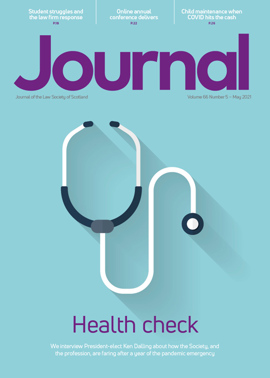COVID challenges and tomorrow's lawyers

As we approach the end of a full year of online teaching, it is important that we collectively take stock of the challenges students have faced as they look to proceed towards the legal profession.
University and the profession are not wholly distinct from one another. If we collectively fail to understand these challenges, positive changes cannot be introduced. It is very easy to write off the adversity that students have faced in the last year as the result of COVID. My overall observation, though, is that COVID has not created as many new challenges as you might think. What it has actually done is magnify existing problems, and we need to change our approach to support overall, not just as a temporary response.
I am in a unique position at Strathclyde Law School, where I have held the administrative roles of senior tutor (overseeing our pastoral care provision across all undergraduate cohorts) and honours coordinator (which also has a pastoral care element). In these roles, I frequently speak to students who have serious personal circumstances concerns, and I want to give an overview of the content of those conversations, with the hope that this contributes to the discussion about pastoral support in the profession.
I am not a trained counsellor, but in my role I have acted as a sounding board for student concerns. Over time, I have spotted trends and patterns, and have noticed that, while there has been an increase in students wanting to access support during COVID, particularly after Christmas 2020, the underlying challenges that students have faced remain relatively unchanged.
Prior concerns and COVID effects
Supporting students is something I care about greatly – I could write far more in explaining the examples cited. I tend to communicate with the more urgent and complicated cases and therefore do not intend to give specific case studies, but equally know that there will be many other students who do not feel comfortable in speaking out, and I want to change that mentality. Yet I have not had a meeting where, when the student explained their circumstances, I have thought that the student's conditions were their fault. Possible exceptions might be plagiarism (dealt with by others in the Law School), or involvement in a criminal act (which I have not come across).
It is not the student's fault if they experience a physical or mental health problem, particularly if due to harm caused by another person. COVID may have increased a feeling of isolation, or delays in treatment and reticence to speak to a GP, but the baseline susceptibility has not changed. It is naive to think that students were not experiencing anxiety and depression pre-COVID, and it is a major step to speak to the University Disability & Wellbeing Service for professional counselling. The coping strategy previously may have been daily conversations in person with peers, but this has not been possible, and we have a first year contingent who have never really met each other and built up those connections.
Students with care commitments for a family member experiencing physical or mental health difficulties, or who are balancing study alongside childcare, would have demands on their time regardless. COVID may increase concerns regarding shielding. Reduced access to childcare, and home schooling (including of younger siblings), would also make demands on time, but such demands would have affected these students pre-COVID too. In terms of other time commitments, many students work part-time to meet living costs. We cannot criticise students for keeping a basic standard of living. However, furlough and redundancies have made it harder to keep in good favour with a paymaster in order to build a financial buffer, whether for redundancy or to dedicate more time to study in honours year.
Magnified disparities
The switch to online teaching has exacerbated some existing disparities. There was an increased demand across the university for students to be able to access content digitally. However, this demand (along with difficulty for library staff in being able to get on campus) meant there were delays. For any students who are visually impaired, or need core content presented in a particular format, there would have been an impact – again a concern outwith COVID that has been magnified because of COVID.
Teaching online has also led to variations between staff in how content is recorded and made available. Students have had to adapt to this, and cope with staff having to familiarise themselves with ways of providing material, either as pre-recorded content, which offered flexibility if students could not be on a computer at a set time, or live recordings which offered a fixed time slot and a lower administrative burden, but also Zoom fatigue and temperamental staff internet connections. While there were some positives (students being able to ask questions in a private message), there was less of a rapport built. Once classes finished, that was it, so debates were curtailed and there was no room to ask a quick question at the end of the session.
The requirement to sit exams at home also highlighted inequities, since every student's circumstances would be different. Not every student had equal access to a laptop (some relied on library computers or a shared household laptop), or internet. The decision was ultimately taken for exams to have a nominal duration, completed over 72 hours, with the idea that students would be able to find time during that window. However, some interpreted this as spending the full three days on a paper, increasing anxiety accordingly.
The format of take home exams meant the School's Student Affairs Committee (which oversees plagiarism and poor academic practice) required to issue guidance on acceptable practice. This affected the group chats on which we relied this year to help foster a student community: many students left these chats for fear of the exam being discussed there once the paper had been released, which further isolated them from their peers.
Students who required to work in the library, for a quiet place because of a lack of space at home, or for research, particularly for honours dissertations, found the opening hours shortened, including in comparison to other Scottish universities, owing to wider non-compliance with COVID guidance by some library users.
Seeking support has consequences?
None of these circumstances are the fault of students and, while we try and provide a supportive environment with dedicated administrative roles and professional university support services and policies, that can only go so far. Where this is of particular interest for the profession is that one of the barriers students face is a self-internalised pressure that if they ask for support, this will be viewed negatively when they seek to enter the profession.
A response to reading the above might be to argue that if the circumstances are so serious, a student should pause their studies and seek time out. However, discussing voluntary suspension always comes across as telling a student they are not able to do something. The term implies a negative, not a positive. A frequent response I have heard in meetings is that potential employers will look at a student's degree start and award dates, notice that they took longer to complete, and count it against them. One thing I would like to see moving forward is for employers to recognise proactively that taking voluntary suspension shows a level of maturity, and to respect that it does not reflect on the student's ability and potential value as an employee. They should also be mindful that the reasons may relate to a sensitive issue.
Comparisons and the competitive market
At a recent careers event hosted by our Strathclyde Student Law Society, I was asked what the best part of my job was. I get to speak to intelligent, hardworking and talented young people daily, and it is a little bit like discovering a band or artist before they are signed by a major label. However, students do compare themselves to others, both in academic performance and career progression. This is disheartening, because the result is that I have had numerous meetings with students where they either do not apply for an opportunity because they think they are not good enough, or they undersell themselves, not through modesty, but lack of confidence.
For example, if a student's friend is offered a traineeship and they are not, the perception automatically is that the student must be worse, as opposed to being perhaps equally capable or having their own strengths. If one of your peers is on 15,000 words for their dissertation project and you are on 5,000, that must mean you are behind – however, the 15,000 may simply be a collection of observations from the literature that lacks the required critical argument. In other words, they are not comparable.
Everyone recognises they are entering a competitive job market, and these career concerns were a problem pre-COVID. If we create a narrative where a student's potential is purely determined on a “Top-Trumps”-esque grading system, we may be penalising students for circumstances that are not their fault. Furthermore, we will be overlooking a talent pool that could be a positive addition to firms. The students I speak to have struggled, but they are still here. They are determined and resilient, which would be great qualities to possess in a professional setting. The chances are that they would be committed employees, actively listen to clients and ultimately demonstrate empathy.
These are only the students who have approached me for support. There will be many others who have not, and the transition into the working environment will be intimidating, but they will not have the same structure in place for support compared to university. These students will soon be colleagues who will need assistance, but equally can offer experience and insight from their own struggles to help others as well.
I do not want this piece to read overly negatively, and COVID has led to some positive developments for professional activities – for example, webinars, conferences, and mooting are now more accessible than they ever have been. The profession, like the universities, has sought to adopt policies and strategies to manage through the pandemic, and these are positive, but they must act as a catalyst for sustained change. My concern is that if we do not start to think about how we structure and demonstrate access to support in that transition from university to employment, we will ultimately be failing a group of hardworking and talented individuals by penalising them for scenarios which are not their fault.







